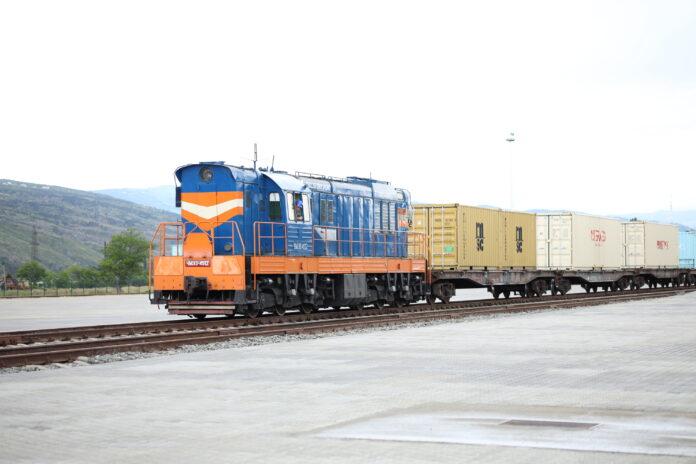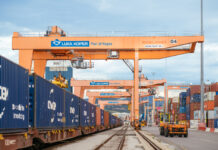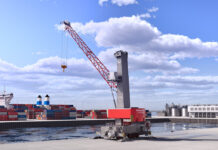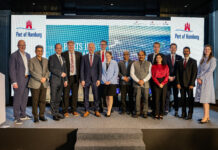
AD Ports Group has announced the inauguration of the first phase of Tbilisi Intermodal Hub, Georgia’s first modern, bonded container and intermodal terminal, and a key logistics link in the company’s emerging Central Asian transport strategy.
The state-of-the-art, rail-linked logistics centre connects the Caspian and Black seas through Georgia, forming a vital part of the Middle Corridor, the shortest trade route between Asia and Europe.
AD Ports Group owns a 60% stake in Tbilisi Intermodal Hub, and the rest is held by Inveco LLC, a local Georgian investment advisory firm, and Wilhelmsen Group.
The first phase of Tbilisi Intermodal Hub is Tbilisi Dry Port, an Inland Container Depot (ICD) handling container cargo delivered by rail and truck.
The Group and its partners plan to expand the facility significantly by early 2026 to add long-term warehousing, additional container yards and truck parking, and a fourth railway spur, to transform it into a full-service import-and-export logistics hub for all of Central Asia.
As it expands in its second and third phases, Tbilisi Intermodal Hub will process many types of cargo, including containerised vehicles, and forms of containerised bulk and break-bulk commodities such as minerals, ores, and fertilizers playing an important role in the supply chains of Georgia, Armenia, and Azerbaijan, as well as an East-West crossroads for goods between China and Europe.
Tbilisi Intermodal Hub’s soft launch commenced on 3 May when it received its first shipment of 30 containers, each carrying over 26 tonnes of cargo, via rail link from an MSC ship docked at Georgia’s Black Sea Port of Batumi.
An inland extension of Batumi and the Port of Poti, Georgia’s key seaports, Tbilisi Intermodal Hub will play a vital role as a logistics staging hub, accelerating trade flows across the Caucasus region and Central Asia. The facility has received both customs zone authorisation and Georgia’s first railway infrastructure operation and safety certification, from the state Rail Transport Agency.
Spanning 7,000 km and requiring a journey of 10 to 15 days, the Middle Corridor is expected to handle up to 1.9 million TEUs annually by 2040, as manufacturers seek to avoid longer seaborne routes.
Beyond serving the Georgian Black Sea ports of Poti and Batumi as a depot for international shipping lines, the intermodal facility will function as a regional logistics hub for goods destined for neighbouring countries such as Armenia and Azerbaijan.
Tbilisi Intermodal Hub is designed for scale and efficiency, featuring three, 600-metre-long railway spurs, two dedicated locomotives for shunting connected to the main rail sorting station, a 50,000 m² container yard equipped with brand-new three-unit reach stackers, and Class B warehouse, covering 2,500 m², and a fleet of forklifts and customs-licensed weighing scales.
In a second phase to be completed by early 2026, a fourth rail spur will be added, as well as a Class A warehouse covering 9,800 m2, and additional container yards.
Tbilisi Intermodal Hub will initially handle up to 96,000 TEUs annually. The facility enables flexible cargo flows from Central Asia and the Far East via multiple transport modes — railcars, shipper-owned containers, and trucks — with seamless cross-docking to ocean carriers for global distribution, and vice versa.
By early 2026, the second phase of construction will more than double the annual handling capacity of Tbilisi Intermodal Hub to up to 200,000 TEUs.




